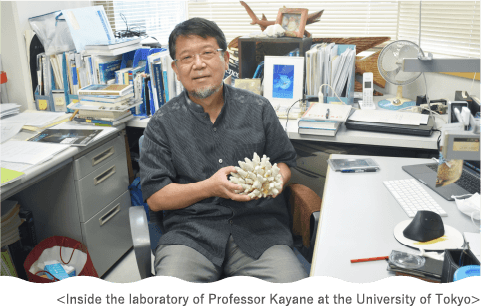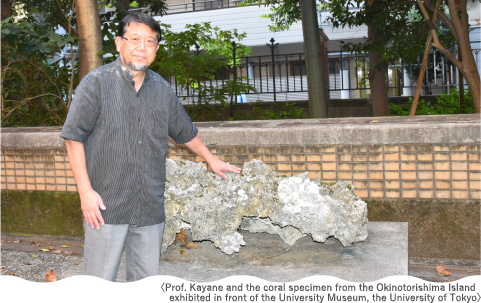
A.My research is mainly on how coral reefs are affected by changes in the global environment, such as coral bleaching caused by global warming, inhibited skeletal formation of coral caused by ocean acidification, and submersion caused by rising sea levels.
A.It started when I was eighteen, and I became interested in coral reefs at a diving circle in university (Marine Expedition Club). I started my research when I was 22 and started my master's degree. When I started my research, there were very few researchers studying coral reefs, but their number gradually increased, and there are now about 600 researchers in the Coral Reef Society. I've been fascinated by coral reefs for over 40 years.
A.I started by investigating the coral reefs of the Ryukyu Islands and then expanded my research to include the Mariana Islands, Republic of Palau, Tuvalu, and the Marshall Islands. We do field surveys on site and measure and analyze collected samples in the laboratory.
A.I'm a faculty member of the Graduate School of Science (Department of Earth and Planetary Science), so I hold lectures and training on global environmental studies, terrestrial ecology, physical geography, human environment systems, and topography and geological surveys. Of course, the subjects of coral and coral reefs come up from the perspective of global environmental studies and physical geography. Since last year, there've been more online lectures, but our research absolutely requires face-to-face practice. We're working with our students on topographical surveys and other activities while taking full consideration of preventing infections.
A.To date, about ten students have become doctors studying coral reefs. There are currently no students in my laboratory, but there are project researchers and support staff conducting research. I hope that researchers who get a degree in my laboratory will make more discoveries about coral reefs.

A.In the beginning, I was studying "atolls," a topography with a coral reef in the shape of a ring surrounding a shallow stretch of ocean several meters deep. Since the Marshall Islands consist of mostly atolls, and Majuro and the Maldives have an altitude of only about 1 to 2 m, there are fears that they would be submerged. Our research started around 2000, and we found that the Okinotorishima Islands was similarly in danger of submersion. Therefore, we established a research group, thinking that research on the Okinotorishima Islands will lead to the preservation of atolls around the world. The Okinotorishima Islands is isolated, so there's no hope that it'll adapt to the rising sea levels and form a new island simply through natural biological actions. Therefore, it's essential to increase the productivity of calcified organisms such as coral. We're striving to maintain the Okinotorishima Islands by developing ecological engineering technologies, such as seeding corals with high reef productivity, culturing larvae, and introducing foraminifera. We're researching every day in order to support the natural island formation processes.